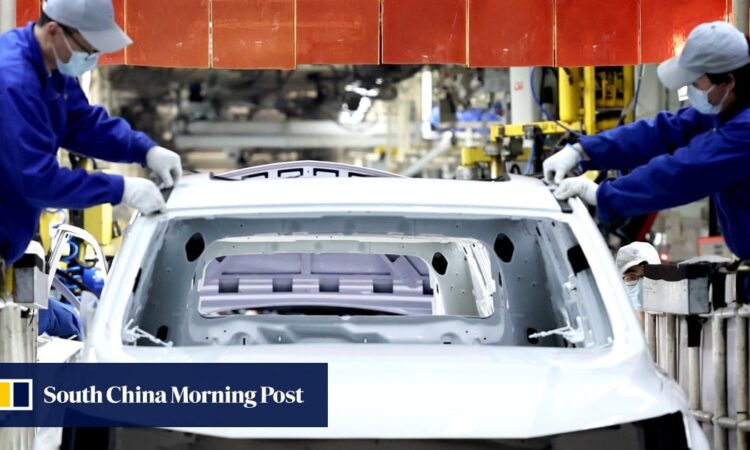
A Chinese automaking behemoth facing a 37.6 per cent tariff on exports of electric cars to Europe is pushing back against what it sees as an “unfair and illegal” probe by European authorities into subsidies from Beijing, while hinting that Brussels’ ruling will face opposition.
Shanghai-based SAIC Motor, the largest of China’s “big four” state-owned carmakers, also said that the EU’s executive arm carried out an anti-subsidy probe “involving commercially sensitive information, such as a request to cooperate in providing battery-related chemical formulas”.
The comments were made in a WeChat post on Monday, after the company had said during a special EU hearing on Friday that the actions were “beyond the normal scope of investigation”.
SAIC said that the European Commission had “made errors” in identifying subsidies, such as by mistaking an auto-financing company under a foreign joint venture as an affiliate of SAIC.
The automaker said it reserved the “right to take further legal measures” in response to the commission’s preliminary decision and expects a final ruling in November, per the WeChat statement.
“SAIC has submitted thousands of written documents during the investigation,” the statement added. “However, the European Commission ignored some key information and defence opinions submitted by SAIC – and inflated the subsidy rates for multiple projects.”
On June 12, the commission released a preliminary ruling with additional duties of 38.1 per cent on SAIC, the statement adds. After SAIC objected, it said, the commission lowered the rate to 37.6 per cent on July 4.
The level of tariff increases on Chinese electric vehicles as a result of the probes has stirred debate about whether China is being singled out.
Beijing’s Ministry of Commerce on July 10 launched an investigation into whether the EU’s Foreign Subsidy Regulation had unfairly targeted Chinese companies. The ministry’s move followed a request by the China Chamber of Commerce to the EU that Beijing take “stringent” measures over the European anti-subsidy proceedings.
SAIC had said previously that the EU had overlooked some information and counterarguments that the carmaker had provided for the investigation.
Alicia Garcia-Herrero, chief economist for the Asia-Pacific region at French investment bank Natixis, speculated that declining to cooperate with European investigators could have affected the tariff rate imposed on SAIC.
Asking a company for its product formulas, Garcia said, is consistent with the World Trade Organization (WTO) rules that the commission has used for its probe. SAIC may find it hard to pass on any new tariffs to European consumers amid current demand levels, she added.
“They probably felt this wasn’t going to happen, and that the EU would back off, but they didn’t,” Garcia-Herrero said.
The European Commission has still come up with little evidence based on WTO rules to show any problems with subsidies, said Lu Xiang, a research fellow at the Chinese Academy of Social Sciences.
“The causal link between export volume and subsidies is an imaginary assumption made by the European side,” Lu said.
Last year, the EU imported 9.7 billion euros (US$10.57 billion) worth of electric-battery vehicles from China, up 70 per cent over the 2022 total, to become the top taker of the Chinese goods, according to the European Automobile Manufacturers’ Association.

.jpg)





